- TOP
- Search Criteria
- A Day in Chofu: Traditional Buildings, Soba and Yokai
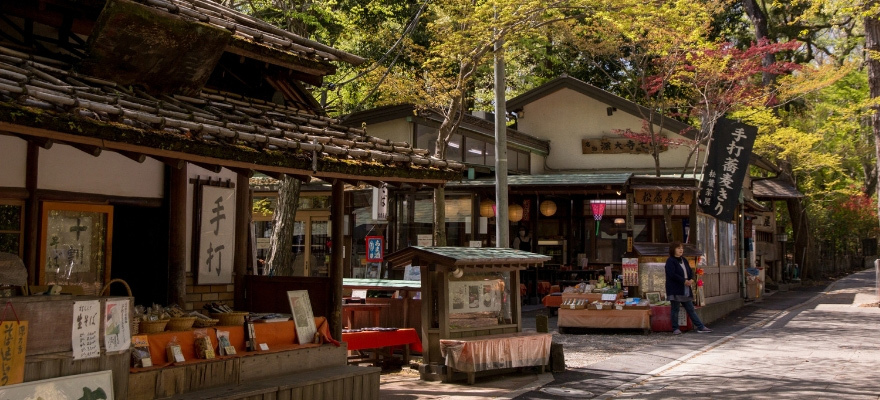
STORY
A Day in Chofu: Traditional Buildings, Soba and Yokai
- TOKYO
- DINING
- SIGHTSEEING
- SPECIAL
- CHOFU
- TEMPLES_AND_SHRINES
- TRADITIONAL_CULTURE
- SOBA
- STREET_FOOD
- JAPANESE_FOOD
- SWEETS
- YOKAI
Few make their way to Chofu on their Tokyo trip and many haven't even heard of it. Located west of the city's 23 wards, this quaint area might not appear to have much to offer at a first glance. If explored, however, Chofu reveals an unsuspected charm and many beautiful spots worth the visit, including the second oldest temple in Tokyo, a unique festival, streets lined with traditional buildings, encounters with yokai and great food.
Here is our report from spending a day in Chofu, seeking out what this hidden gem has to offer.
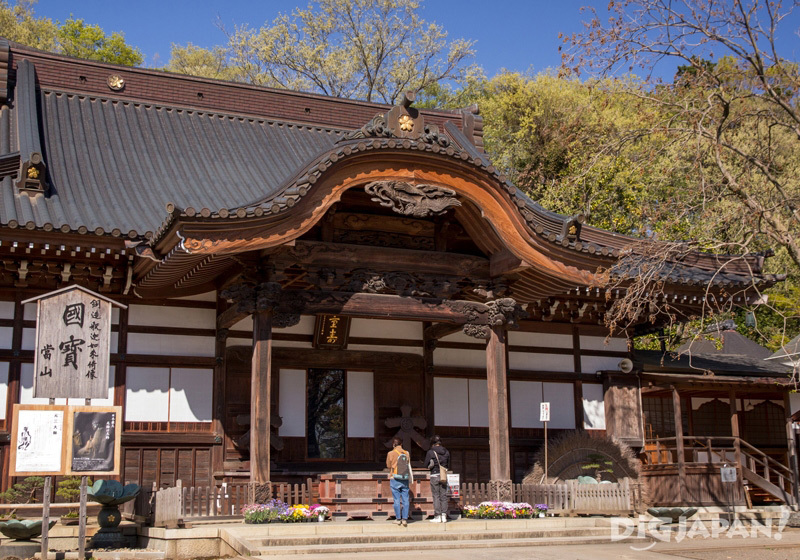
The first thing we did upon arriving at Chofu Station was taking the number 34 bus to Jindaiji Temple. Nestled on a hillside, this temple covers a large area that includes the main hall (picture above) and several other buildings.
Founded almost 1300 years ago in 733, Jindaiji is the second oldest temple in Tokyo after the Sensoji in Asakusa.
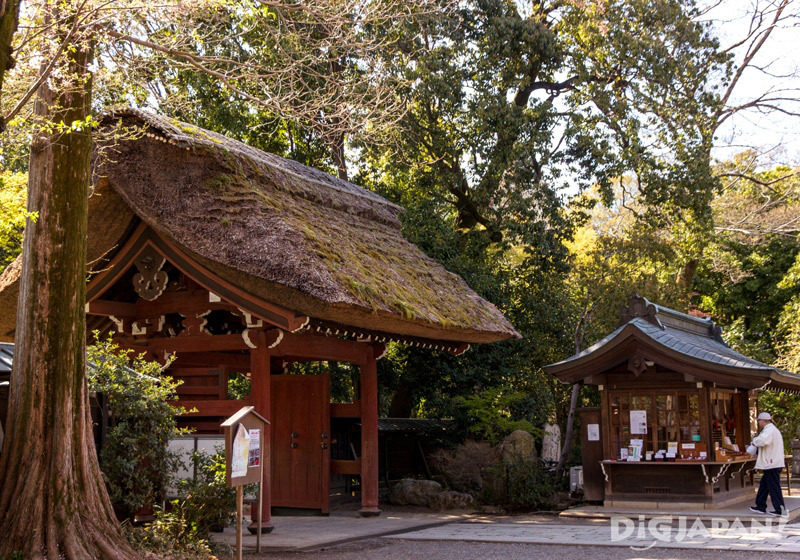
This entrance gate is called San-mon and it's the temple's oldest building. It also has a unique design with a thatched roof.
Near the temple grounds are also the Jindai Botanical Gardens, filled with beautiful seasonal flowers and plants.
Address: 5-15-1 Jindaiji Motomachi, Chofu-shi, Tokyo (MAP)
Access: From Chofu Station take the Keio bus bound for Jindaiji and get off at the last stop (approx. 15 min. ride).
Website: https://www.jindaiji.or.jp/language/english.pdf
To this day the temple grounds and the streets around it are lined with traditional soba restaurants. The beautiful wooden buildings make for a great atmosphere and a perfect background for a stroll. After visiting Jindaiji we decided to walk around for a while and try some of the local street food.
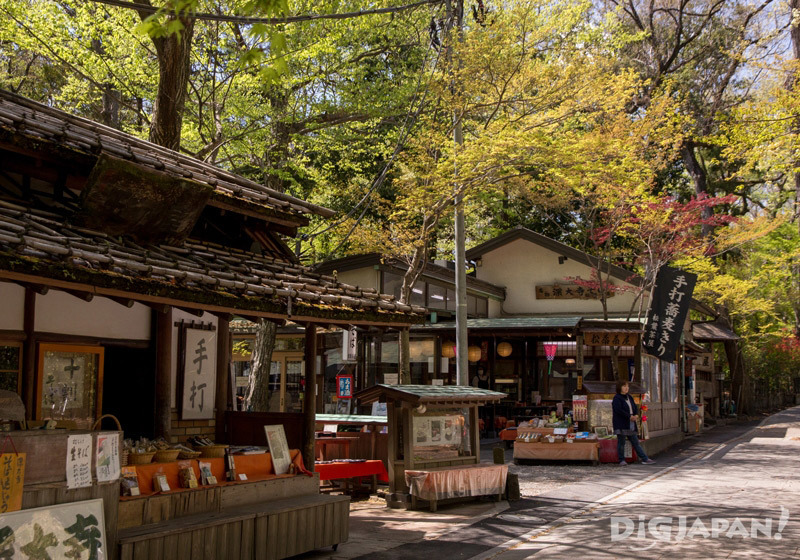
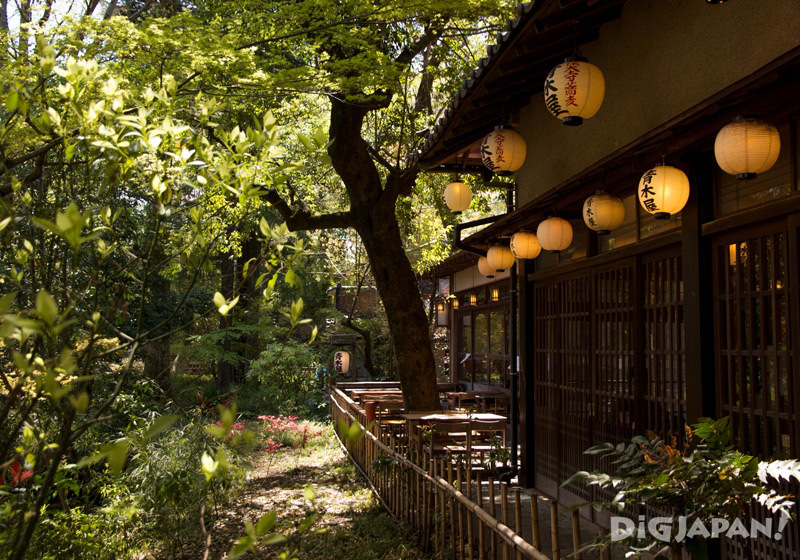
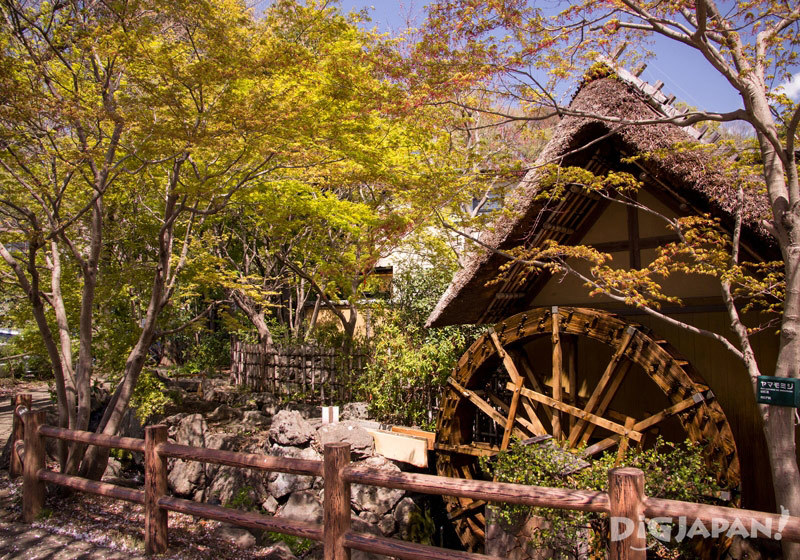
There are even some waterwheels around the area. The Jindaiji Suishakan (pictured above) is a working one that also hosts a display on waterwheels. If you request it in advance you can use it to process your own rice or grind your buckwheat into flour.
The rhythmic sound of the waterwheel turning is very soothing and we spent some time just listening to it.
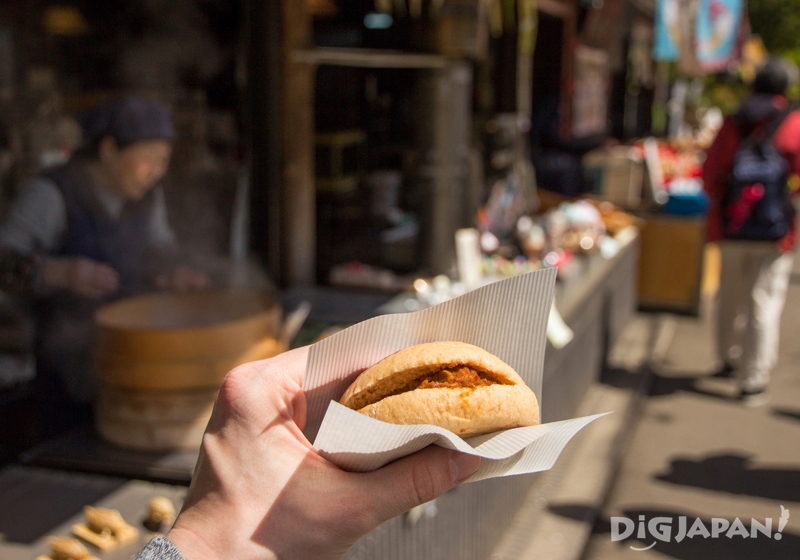
Many of the shops in the area sell sweets and snacks made with buckwheat. One of the most popular is the soba bread from Ameya. They use buckwheat to make extra soft steamed buns that they fill with a variety of ingredients. We tried the keema curry bun.
Address: 5-15-10 Jindaiji Motomachi, Chofu-shi, Tokyo (MAP)
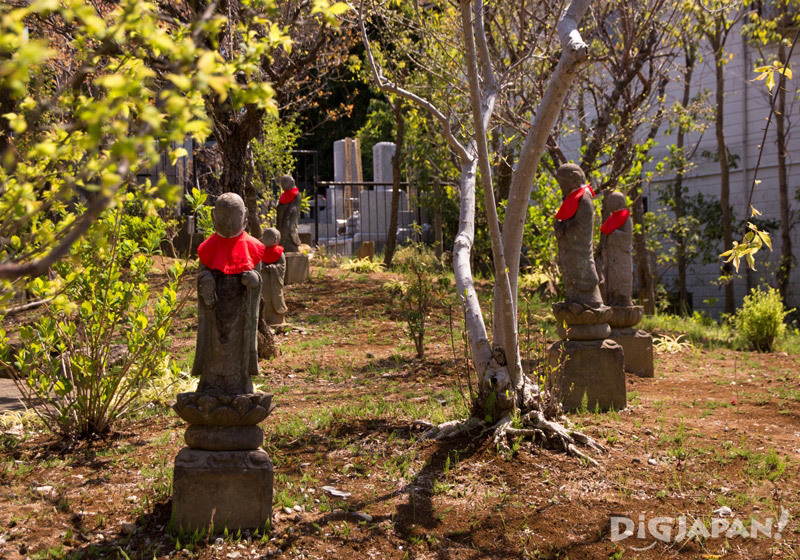
A little slope on the western side of Jindaiji took us to the Jizo Village. This tiny green area is dotted with statues of Jizo, protector of travelers and children. It's a little magical place that's worth passing through.
Address: 5 Jindaiji Motomachi, Chofu-shi, Tōkyō-to (MAP)
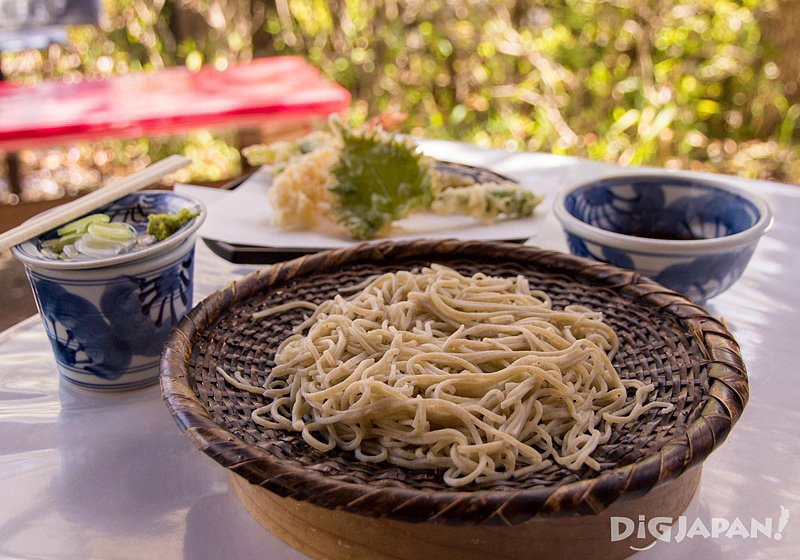
Our first pick was a classic set of cold soba and tempura. The noodles were very fresh and the dipping sauce delicious.
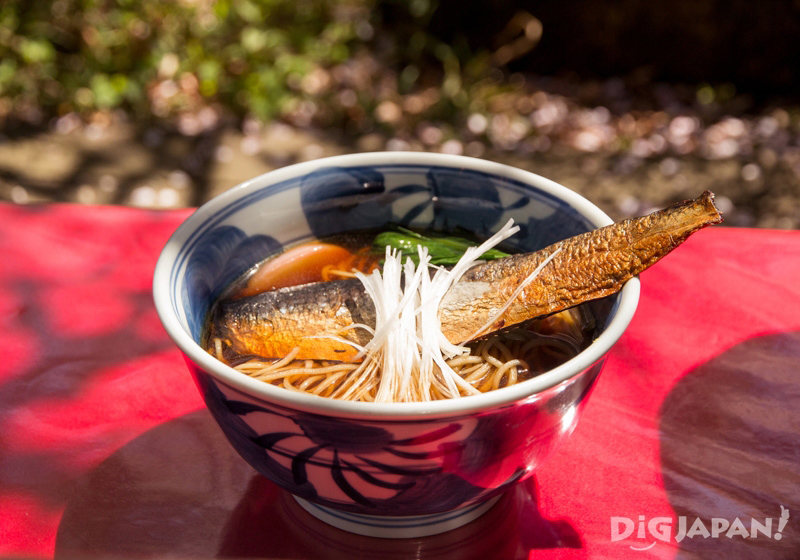
Since there are so many soba restaurants around here it's no surprise that they will come up with different and unique dishes. So we also tried a hot bowl of soba topped with a very tasty simmered herring.
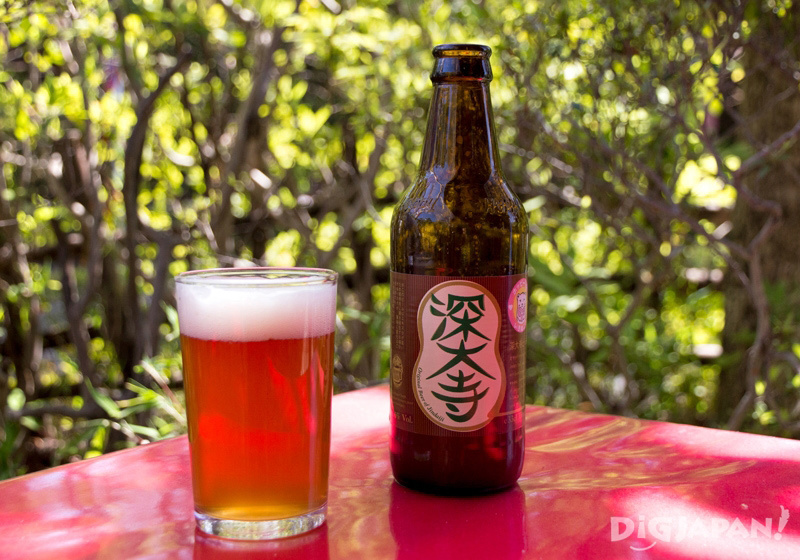
Of course we had to wash down our meal with a local craft beer! Jindaiji beer is made with German yeast and local spring water. You can find it in most restaurants and shops around here.
Address: 5-9-1 Jindaiji Motomachi, Chofu-shi, Tokyo (MAP)
Hours: 10:30 a.m. - 5:00 p.m.
Closed on Thursday
Website (Japanese-only): http://www.yusui.co.jp/
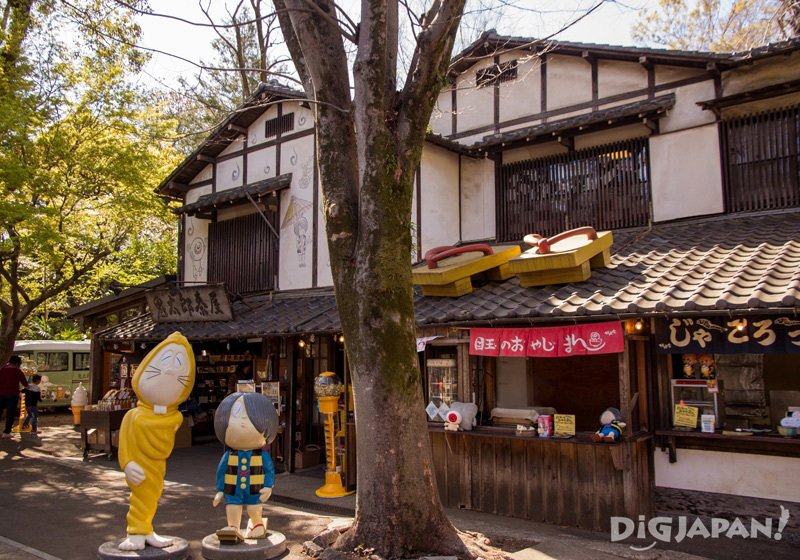
We stopped by to browse the shop and try the themed menu inside the café.
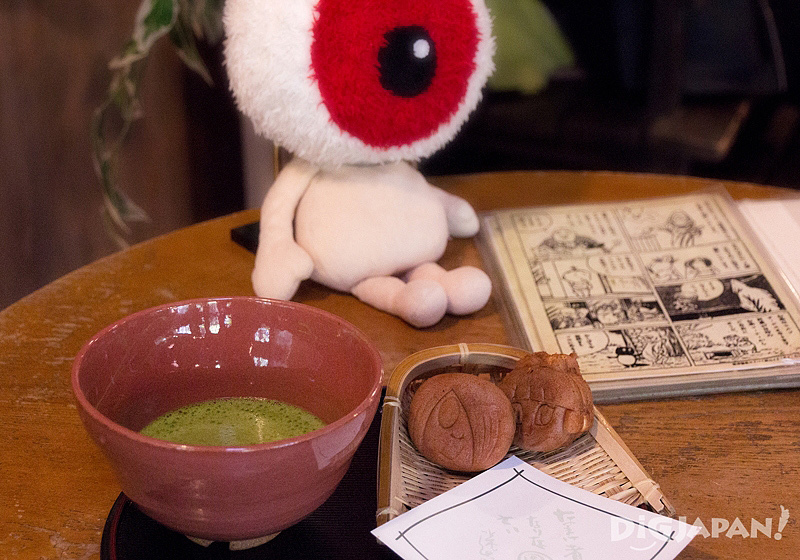
This classic set of matcha tea and sweets comes with two sweet cakes shaped like characters from the manga. The choices are random so you never know which characters you get.
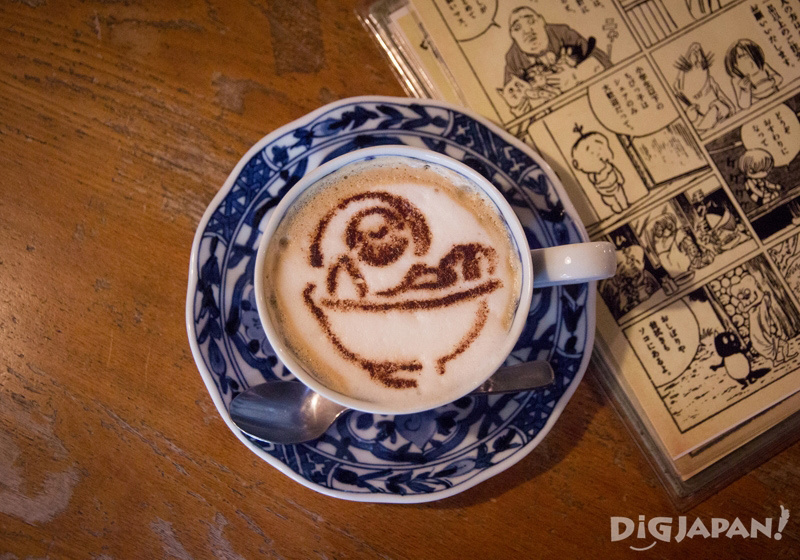
For coffee lovers, you can choose between four different designs of Kitaro-themed latte art.
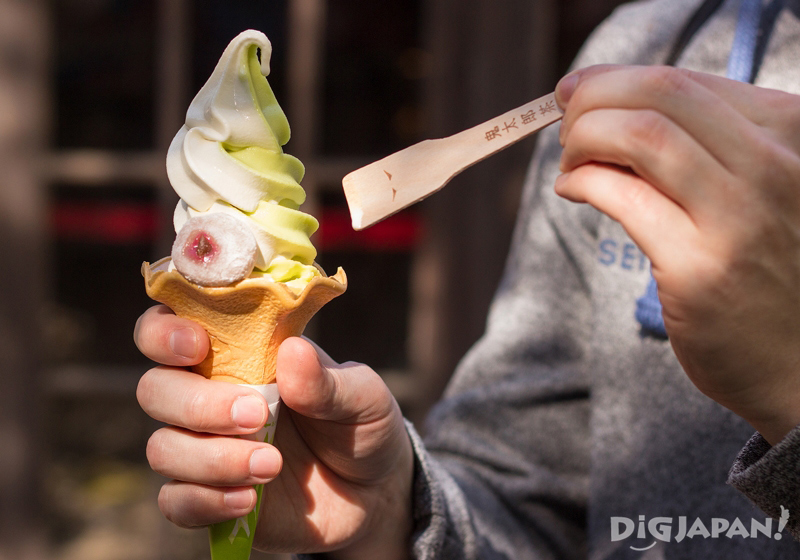
The nice weather outside called for an ice cream. Even this is haunted by yokai! Fans of the series will recognize the flying yokai Ittanmomen in the spoon, and the eyeball of Medamaoyaji made from a mochi cake.
Address: 5-12-8 Jindaiji Motomachi, Chofu-shi, Tokyo (MAP)
Hours: 10:00 a.m. - 5:00 p.m. (food/drink last order 4:30)
Closed on Monday (closure moved to following day if Monday is a holiday)
Website (Japanese-only): http://kitaro-chaya.jp/
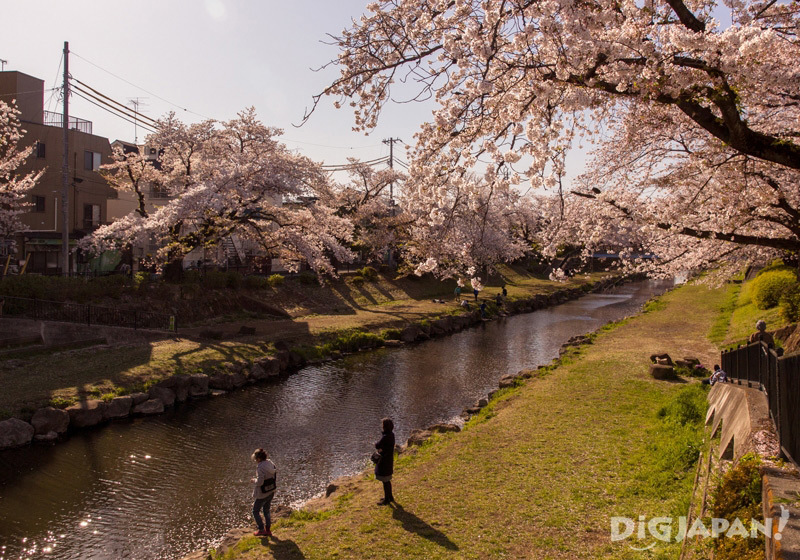
We walked through pretty and quiet residential neighborhoods, past houses perched on top of slopes and kids playing in the streets. Crossing the No river we stopped to bask in the late afternoon sunlight.
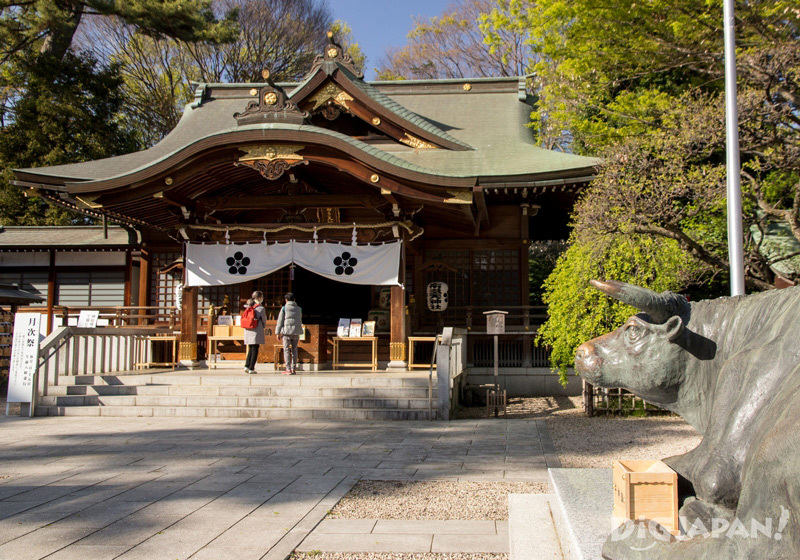
The road took us straight to Fudaten Shrine, considered a "power spot" by locals. The shrine is dedicated to the god of learning and many people come here to pray for good results in exams and school. A trademark of the shrine is the big ox statue that is said to bring good fortune if stroked.
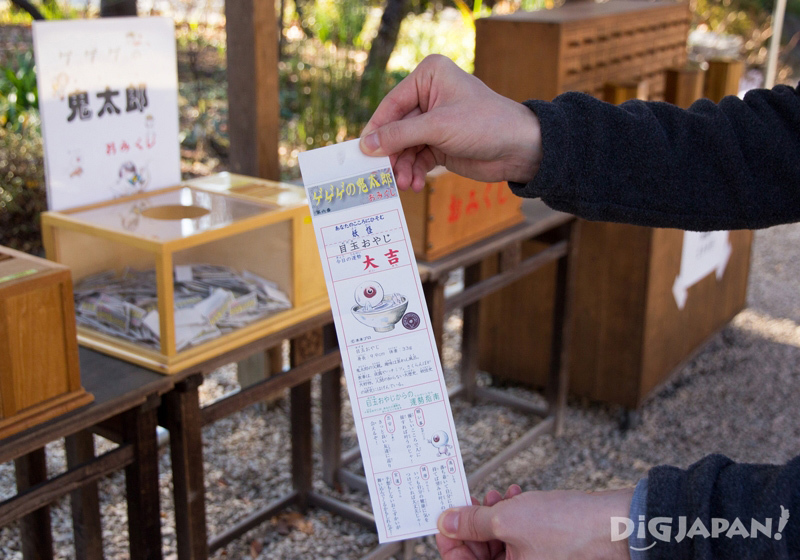
The fortune-telling sheets called omikuji at Fudaten Shrine are themed after Gegege no Kitaro! Another homage to Shigeru Mizuki.
Address: 1-8-1 Chofugaoka, Chofu-shi, Tokyo (MAP)
Website (Japanese-only): http://fudatenjin.or.jp/
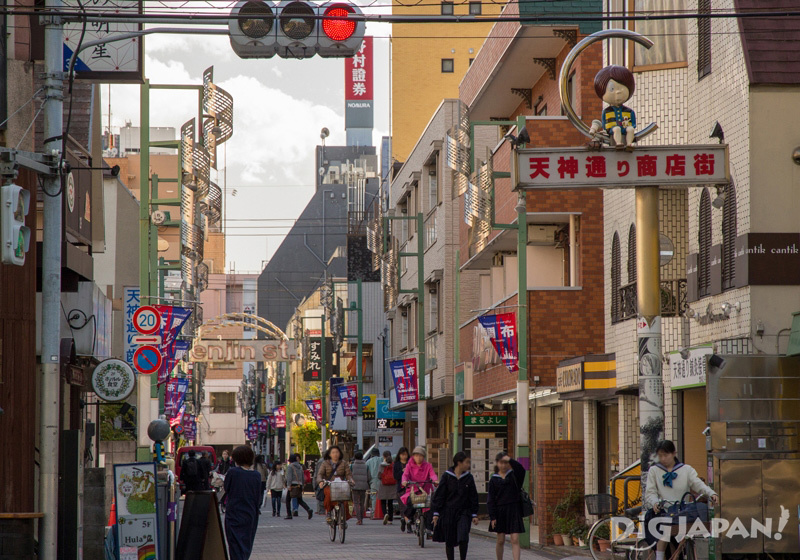
On the way back to the station we took a stroll through Tenjin-dori, a shopping street that is famous for featuring statues of Gegege no Kitaro characters. Here you'll find all kinds of restaurants and cafes, as well as sweets and souvenir shops. The road has a local feel and it's a lot of fun to explore.
Address: 1-3 Fuda, Chofu-shi, Tokyo (MAP)
Chofu Station | 調布駅
Access: approx. 15 minutes from Shinjuku Station on the Keio Line
About the Author
Laura is an Italian living and working in Tokyo. She loves exploring hidden and unknown places, taking pictures and listening to Punk Rock music. When she’s not busy doing the above, she might enjoy a craft beer or play the sanshin (an Okinawan instrument similar to a shamisen).
Here is our report from spending a day in Chofu, seeking out what this hidden gem has to offer.
Feeling the History at Jindaiji Temple

The first thing we did upon arriving at Chofu Station was taking the number 34 bus to Jindaiji Temple. Nestled on a hillside, this temple covers a large area that includes the main hall (picture above) and several other buildings.
Founded almost 1300 years ago in 733, Jindaiji is the second oldest temple in Tokyo after the Sensoji in Asakusa.

This entrance gate is called San-mon and it's the temple's oldest building. It also has a unique design with a thatched roof.
Near the temple grounds are also the Jindai Botanical Gardens, filled with beautiful seasonal flowers and plants.
Information
Jindaiji Temple | 深大寺Address: 5-15-1 Jindaiji Motomachi, Chofu-shi, Tokyo (MAP)
Access: From Chofu Station take the Keio bus bound for Jindaiji and get off at the last stop (approx. 15 min. ride).
Website: https://www.jindaiji.or.jp/language/english.pdf
■Catch the Daruma Market in March!
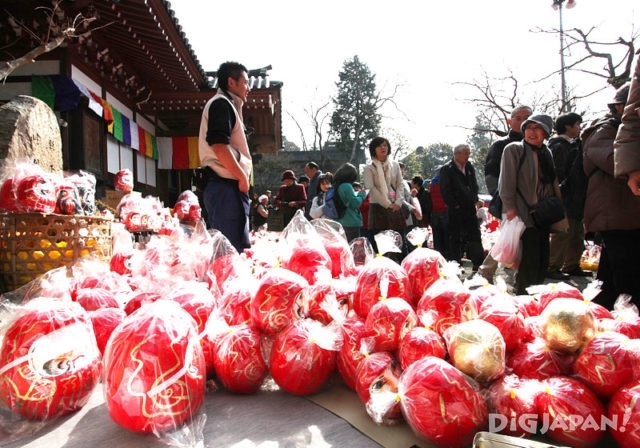
Every year on March 3rd and 4th Jindaiji Temple hosts the Daruma ichi. Over 300 stalls selling Daruma dolls gather on the temple grounds during this celebration.
Daruma dolls are considered a symbol of perseverance and they're often displayed in many Japanese houses and establishments. When you have a resolution or something that you want to accomplish, draw in one of the daruma's eyes. When the desired thing is accomplished you draw the other eye in (the significance and use of the Daruma might vary in certain areas and traditions).

Every year on March 3rd and 4th Jindaiji Temple hosts the Daruma ichi. Over 300 stalls selling Daruma dolls gather on the temple grounds during this celebration.
Daruma dolls are considered a symbol of perseverance and they're often displayed in many Japanese houses and establishments. When you have a resolution or something that you want to accomplish, draw in one of the daruma's eyes. When the desired thing is accomplished you draw the other eye in (the significance and use of the Daruma might vary in certain areas and traditions).
Traditional Houses, Waterwheels and Street Food
The area around Jindaiji Temple is rich in spring water and was said to be suited for the cultivation of buckwheat (soba in Japanese). For this reason the local peasants used to offer buckwheat to the temple rather than rice during the Edo period (1603-1868). The temple then used it to make soba noodles for its visitors.To this day the temple grounds and the streets around it are lined with traditional soba restaurants. The beautiful wooden buildings make for a great atmosphere and a perfect background for a stroll. After visiting Jindaiji we decided to walk around for a while and try some of the local street food.

Some picturesque soba restaurants inside the temple grounds

Soba restaurant immersed in nature

There are even some waterwheels around the area. The Jindaiji Suishakan (pictured above) is a working one that also hosts a display on waterwheels. If you request it in advance you can use it to process your own rice or grind your buckwheat into flour.
The rhythmic sound of the waterwheel turning is very soothing and we spent some time just listening to it.

Soba pan - 300 yen
Many of the shops in the area sell sweets and snacks made with buckwheat. One of the most popular is the soba bread from Ameya. They use buckwheat to make extra soft steamed buns that they fill with a variety of ingredients. We tried the keema curry bun.
Information
Ameya | あめやAddress: 5-15-10 Jindaiji Motomachi, Chofu-shi, Tokyo (MAP)

A little slope on the western side of Jindaiji took us to the Jizo Village. This tiny green area is dotted with statues of Jizo, protector of travelers and children. It's a little magical place that's worth passing through.
Information
Jizo no Sato | 地蔵の里Address: 5 Jindaiji Motomachi, Chofu-shi, Tōkyō-to (MAP)
■Bonus: secret Mt. Fuji viewing spot!
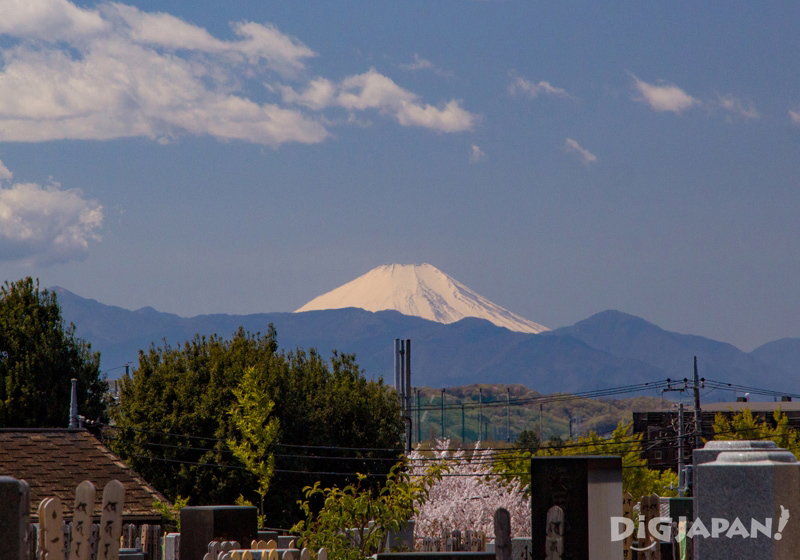
If you keep walking up the hill past the Jizo Village you will get to a cemetery. On a clear day you can get a really nice view of Mt. Fuji from here! We only noticed it because a very nice Japanese lady came out of nowhere and literally dragged us to the spot.

If you keep walking up the hill past the Jizo Village you will get to a cemetery. On a clear day you can get a really nice view of Mt. Fuji from here! We only noticed it because a very nice Japanese lady came out of nowhere and literally dragged us to the spot.
Trying Jindaiji Soba
After some exploration it was time to try this famous Jindaiji soba! So many restaurants are concentrated in this area so there's a lot of choice. We headed to a place called Yusui that had some nice tables outside.
Yusui tenmori soba - 1,450 yen
Our first pick was a classic set of cold soba and tempura. The noodles were very fresh and the dipping sauce delicious.

Nishin soba - 1,000 yen
Since there are so many soba restaurants around here it's no surprise that they will come up with different and unique dishes. So we also tried a hot bowl of soba topped with a very tasty simmered herring.

Of course we had to wash down our meal with a local craft beer! Jindaiji beer is made with German yeast and local spring water. You can find it in most restaurants and shops around here.
Information
Yusui | 湧水Address: 5-9-1 Jindaiji Motomachi, Chofu-shi, Tokyo (MAP)
Hours: 10:30 a.m. - 5:00 p.m.
Closed on Thursday
Website (Japanese-only): http://www.yusui.co.jp/
Having Tea with the Yokai
On the picturesque street leading up to Jindaiji is a big building that seems to be haunted by yokai (Japanese traditional monsters). These are the characters from Gegege no Kitaro, a famous manga series by Shigeru Mizuki. The author lived in Chofu for part of his life and that's why there are many tributes to him in the area. Kitaro Chaya is a shop and cafe themed after Gegege no Kitaro.
©MIZUKI Productions
We stopped by to browse the shop and try the themed menu inside the café.

©MIZUKI Productions
Yokai Matcha set - 600 yen
This classic set of matcha tea and sweets comes with two sweet cakes shaped like characters from the manga. The choices are random so you never know which characters you get.

©MIZUKI Productions
Gegege latte - 500 yen
Gegege latte - 500 yen
For coffee lovers, you can choose between four different designs of Kitaro-themed latte art.

©MIZUKI Productions
Soft serve ice cream - 400 yen
Soft serve ice cream - 400 yen
The nice weather outside called for an ice cream. Even this is haunted by yokai! Fans of the series will recognize the flying yokai Ittanmomen in the spoon, and the eyeball of Medamaoyaji made from a mochi cake.
Information
Kitaro Chaya | 鬼太郎茶屋 調布市深大寺店Address: 5-12-8 Jindaiji Motomachi, Chofu-shi, Tokyo (MAP)
Hours: 10:00 a.m. - 5:00 p.m. (food/drink last order 4:30)
Closed on Monday (closure moved to following day if Monday is a holiday)
Website (Japanese-only): http://kitaro-chaya.jp/
Exploring Residential Tokyo
From the Jindaiji area we decided to walk back to the station instead of taking the bus. It's a 30 minute walk and there are more things to discover along the way.
We walked through pretty and quiet residential neighborhoods, past houses perched on top of slopes and kids playing in the streets. Crossing the No river we stopped to bask in the late afternoon sunlight.

The road took us straight to Fudaten Shrine, considered a "power spot" by locals. The shrine is dedicated to the god of learning and many people come here to pray for good results in exams and school. A trademark of the shrine is the big ox statue that is said to bring good fortune if stroked.

©MIZUKI Productions
The fortune-telling sheets called omikuji at Fudaten Shrine are themed after Gegege no Kitaro! Another homage to Shigeru Mizuki.
Information
Fudaten Shrine | 布多天神社Address: 1-8-1 Chofugaoka, Chofu-shi, Tokyo (MAP)
Website (Japanese-only): http://fudatenjin.or.jp/

©MIZUKI Productions
On the way back to the station we took a stroll through Tenjin-dori, a shopping street that is famous for featuring statues of Gegege no Kitaro characters. Here you'll find all kinds of restaurants and cafes, as well as sweets and souvenir shops. The road has a local feel and it's a lot of fun to explore.
Information
Tenjin-dori Shotengai | 天神通商店街Address: 1-3 Fuda, Chofu-shi, Tokyo (MAP)
Chofu Station | 調布駅
Access: approx. 15 minutes from Shinjuku Station on the Keio Line
We hope you enjoyed virtually spending a day in Chofu with us! Chofu is a great day activity for those who want to explore the lesser-known parts of Tokyo. Here you can find history, traditional food, pop culture and a local vibe all in one place.
About the Author
Laura is an Italian living and working in Tokyo. She loves exploring hidden and unknown places, taking pictures and listening to Punk Rock music. When she’s not busy doing the above, she might enjoy a craft beer or play the sanshin (an Okinawan instrument similar to a shamisen).

Liked this story? Like DiGJAPAN!
on Facebook for daily updates!
THIS ARTICLE IS BASED ON INFORMATION FROM 07 03,2019 Author:DiGJAPAN! Editorial Team













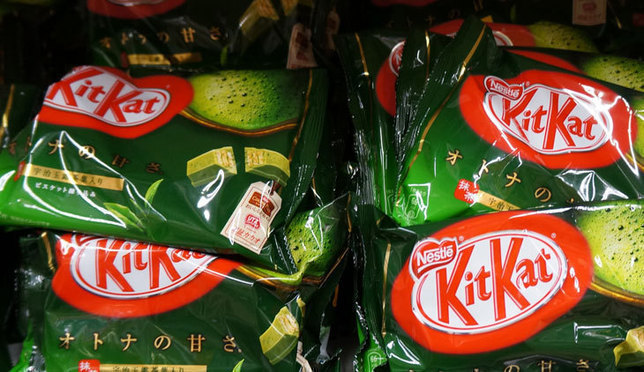
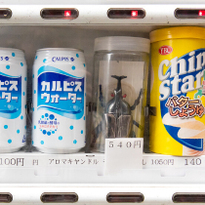
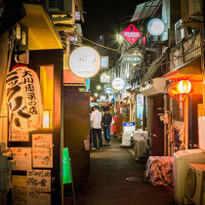
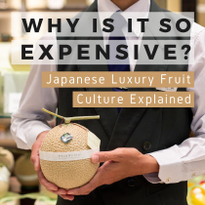
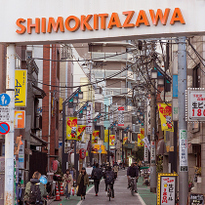




NEW COMMENT | 0 COMMENTS
Open a DiGJAPAN!
account to comment.
Open a DiGJAPAN! Account